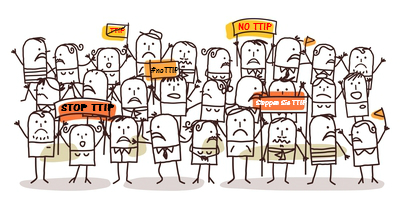On October the 3rd, the 7th week-long round of TTIP negotiations closed with the wonderfully named EU Chief TTIP Negotiator, Ignacio Garcia Bercero, stating somewhat blandly (Can we expect more? Yes we can): “We have again had a week of productive discussions. Negotiations are now moving smoothly into the textual phase, where discussions are based on specific textual proposals”. Hmmmm, what does that mean? Essentially there were three agenda’s: i) the negotiators' discussions (the two pillars - regulatory and rules, and of course services) ii) the stakeholder events and iii) the political context. So what happened next? Well 6 days later, EU Trade Commissioner De Gucht (outgoing) stated "I’m delighted that EU governments decided to make the TTIP negotiating mandate public – something I've been encouraging them to do for a long time.” Errr, really, after 4.5 years and letting all that opposition mount… So into the spotlight of public scrutiny and democratic accountability, tiptoes TTIP.
In short, the EU TTIP mandate (the EU goals and scope) is not that interesting and we all knew it anyway, but importantly it is now available on the European Commission’s (EC) website (yippee), just click here. It was a very political statement in the face of continued opposition within the EU. Of real interest will be the transparency of future negotiations, publications and statements from the newly formed EU TTIP leadership.
Now over to the anti-TTIPers, of which there is a growing chorus that forced that particular outing. Across Europe, on Saturday 11th October, there were over 300 anti-TTIP demonstrations, to quote the Greens/European Free Alliance "A large and growing sense of unease and concern among the European public and civil society about the ongoing TTIP negotiations. This concern reflects the broad scope of the negotiations and their possible implications on European standards, and is reinforced by the opaque negotiation process. We need to be sure those negotiating on the EU's behalf do not budge an inch on EU standards and full transparency is key in this regard."

The overall premise is that TTIP undermines excellent EU regulation and standards, which apparently are so much better than those in the USA. Given those views, amazing how >350 American citizens manage to survive and why do so many EU citizens head across the Atlantic to live and work. Perhaps more worrying for pro TTIPers is the evident increasing German (the masters of the EU/US economic relationship) TTIP skepticism, as it reconsiders its relationship with the USA due to NSA spying. German leadership see a clear distinction between trade, as acceptabe and investment, the infamous Investor-State Dispute Settlement (ISDS), as unacceptable. The SPD and German trade unions are key in the process, and they are not convinced.
Looking forward, with a certain level of pragmatic optimism, given more transparency to present a clearer situation by all sides; the negotiating teams, the respective mandates USA v’s EU, Pro v’s Anti, Trade v’s Investment, economists US (apparently pro) EU (apparently anti), politicians of all stripes, TTIP might just make it. Then the question will be in what (reduced) form. Watch this space as we report back to you on the “textual phase”.
Want to learn more about TTIP? Watch our video and read our whitepaper!

